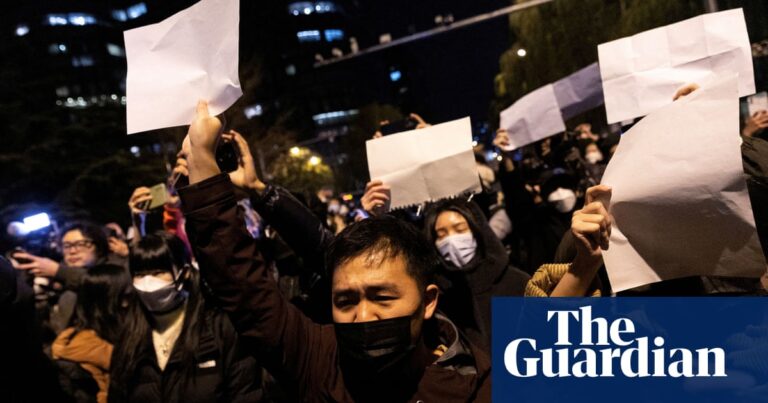OhOn Monday, two parallel views of Chinese activism appeared on X. One was a video showing a small protest outside a school in the western province of Sichuan. The other, from a related account, was a post promoting a memecoin and something it called the “$Li vision”, adding that “some of the biggest coins have had rocky starts” .
The man behind both accounts is Li Ying, a Chinese art student turned activist based in Milan. His original X account, “Teacher Li is Not Your Teacher,” is one of the most important news feeds in the Chinese diaspora. To his nearly 2 million followers, Li shares photos and videos of events from China which would be censored inside the country.
Li’s second account, created to launch the “$Li community,” including a memecoin called Li, has fewer than 10,000 followers so far. He launched the coin last month, he said, to “help people come together to build something together.” But his foray into cryptocurrencies has divided his supporters, some of whom see it as a crude attempt to monetize trust earned through activism.
Since Li started sharing videos of the White Paper Events in 2022, his story has become a hugely influential source of unfiltered news about China. The protests, led by people at breaking point after nearly three years of strict Covid lockdown restrictions, were the largest display of mass dissent against Communist Party rule since Xi Jinping came to power .
Beijing wanted to crush them – as soon as possible. Media coverage of events in China was quickly censored. Those who attempted to document the events were arrested. In a country where people can be punished for speaking out, the symbol of the protests became a blank sheet of white A4 paper – which demonstrators held up in their thousands.
Most Western news and social media platforms, including X, are blocked in China. But they are available to people who use software to bypass the Internet censorship firewall. Li, then an art student in Milan, received hundreds of videos every day from people desperate to tell the world what was really happening in China.
The arguments continued long after the protests against the White Paper had ended. His followers numbered into the millions, and managing the account quickly became a full-time job.
However, life as a Chinese dissident abroad involves “tons of interviews” but few job prospects, says Huang Yicheng, an activist and former Li supporter. “It’s very difficult for us to find normal work in the West because of political pressure…it is very difficult to make a living. » says Huang, leaving for Germany in 2023.
Historically, anti-CCP activists have found refuge in American and European universities or obtained other forms of institutional funding. But these positions are rare and many mainland Chinese activists, like Huang, believe that donors today prefer to support Chinese minorities, such as the Uighurs and Tibetans, or the Hong Kongers.
This means that some, but not all, activists are turning to their online audiences for support. Li Ying has information about his PayPal account in his biography
Li claims his family in China was harassed because of his activism and his Chinese bank cards were frozen. The authorities also repressed his supporters. Last year in February, several people were summoned for questioning by the Ministry of State Security, according to Li. He informed that people no longer follow him; Overnight, he lost 200,000 subscribers. He employs a small team of people to help manage his accounts using the money he receives from individual donations, but says growth has reached a “bottleneck”.
“Even though we have become the largest overseas news service, we are still in a very difficult situation,” Li said.
So on December 18, in what Li describes as an attempt to “build a decentralized ecosystem of the overseas Chinese community,” he launched a cryptocurrency memecoin, called Li. According to the announcement that accompanied When the coin launches, the project team will control a quarter of the coins, while Li himself will own 2%. He insists he is not motivated by profit from the project.
Li says the coin, which has dropped more than 80% in value since the day it launched, will help people “come together to build something together.” Explaining why he chose to launch a memecoin, known for being highly speculative and prone to volatile fluctuations, rather than turning to traditional funding sources, Li says institutional backers are often bureaucratic and slow. He also likes the decentralized ideology behind memecoins. “I saw that many memecoins can form their own communities and strong forces… it’s fascinating.”
Others were less convinced. Online critics accused Li of exploiting the trust he had built over many years of harsh CCP censorship. “The memecoin is tearing apart the dissident community overseas,” says Huang, referring to the divisions sparked by Li’s kickoff. “And it’s a very, very sad thing for the whole movement.”
Lu Yuyuanother Chinese dissident based in Canada, is of the same opinion. Li “used the attention and trust accumulated by sharing information related to the White Paper movement to promote this extremely risky memecoin,” he claims.
Some have mentioned Guo Wenguithe self-described Chinese dissident and Donald Trump defender who was convicted in July of multiple counts of fraud and money laundering for using his online influence as a critic of the CCP to defraud his supporters of a billion dollars, notably via a cryptocurrency project.
Li says such comparisons are unwarranted. His detractors suffer from a “passing misunderstanding,” he says. “Some people don’t understand cryptocurrency, especially since the Guo Wengui incident… But if I can really use this thing, I can help more people, I can build a new ecosystem and realize the visions I wanted to do at first. Then, I believe people will slowly understand the importance of my project over time.

